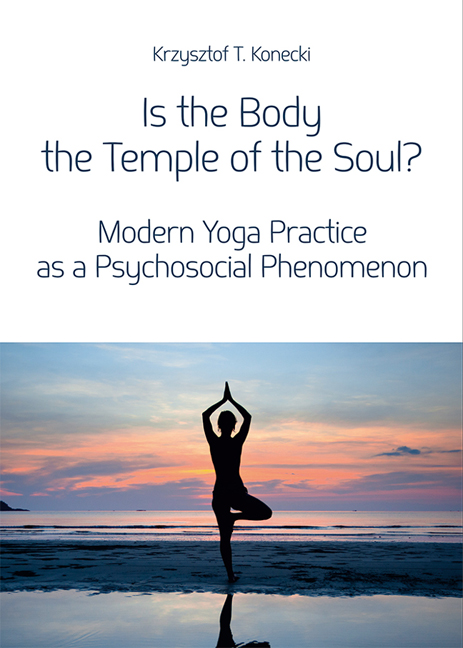Book contents
- Frontmatter
- Contents
- Foreword (Michał Szczepanik)
- Introduction
- Chapter 1 Philosophy and hatha-yoga practice. Para-religious aspects of hatha-yoga
- Chapter 2 The social world of yoga practice
- Chapter 3 Commonsense definitions of yoga and its meaning for practitioners
- Chapter 4 The process of becoming a hatha-yoga practitioner
- Chapter 5 Visual transmission of knowledge and the meaning of corporality and gestures in the social world of yoga practice
- Chapter 6 Emotions and yoga practicing. Working on emotions and achieving “emotional culture” without emotions
- Chapter 7 Teacher and guru in hatha-yoga practice
- Conclusions
- Bibliography
Chapter 3 - Commonsense definitions of yoga and its meaning for practitioners
Published online by Cambridge University Press: 10 January 2018
- Frontmatter
- Contents
- Foreword (Michał Szczepanik)
- Introduction
- Chapter 1 Philosophy and hatha-yoga practice. Para-religious aspects of hatha-yoga
- Chapter 2 The social world of yoga practice
- Chapter 3 Commonsense definitions of yoga and its meaning for practitioners
- Chapter 4 The process of becoming a hatha-yoga practitioner
- Chapter 5 Visual transmission of knowledge and the meaning of corporality and gestures in the social world of yoga practice
- Chapter 6 Emotions and yoga practicing. Working on emotions and achieving “emotional culture” without emotions
- Chapter 7 Teacher and guru in hatha-yoga practice
- Conclusions
- Bibliography
Summary
Introduction
In this chapter, we introduce commonsense definitions of yoga. How is yoga defined by the practitioners themselves? What is it for them? What role does it play in their lives? In the life of an individual, definitions of situations and ascribing meanings to the objects of the “outer” world are very important. Yoga, being a set of practices, cannot enter the world of the individual without having defined meanings that the individual ascribes to it. The activeness of a practitioner in the world of yoga depends on the importance that the individuals as cribe to these practices and what they mean to them in their lives. The more meaning an individual ascribes to the practice of yoga practice, the more he/she engages in it and remains in the social world of yoga. The interpretational work is, of course, done individually, but the social surroundings and the dominant interpretational frame connecting the body and health in the modern world are of great significance in the process. This frame in the social world of yoga is built upon the classic texts by yoga masters. The language used in describing the experience of yoga practice has already been shown. This language co-produces the experience, including the bodily feelings. Language classifications are acts of placement. Definitions help to place an object in particular categories. Is yoga a physical activity or a spiritual one? By placing an object, often by defining it, we obtain directions for our actions. Language classifications are also evaluations of the objects of perception. The value is an evaluation of an object (Strauss 1997: 23–25). The value of yoga is not in yoga itself, it is in the minding of and evaluation of yoga.
The interpretations presented below are an example of common sense theorizing in the context of defining basic activities. Theorization is supposed to legitimize the social world, mark its independence from other worlds, and give the motives, voice, and justification for taking part in this world.
- Type
- Chapter
- Information
- Is the Body the Temple of the Soul?Modern Yoga Practice as a Psychosocial Phenomenon, pp. 69 - 82Publisher: Jagiellonian University PressPrint publication year: 2016



